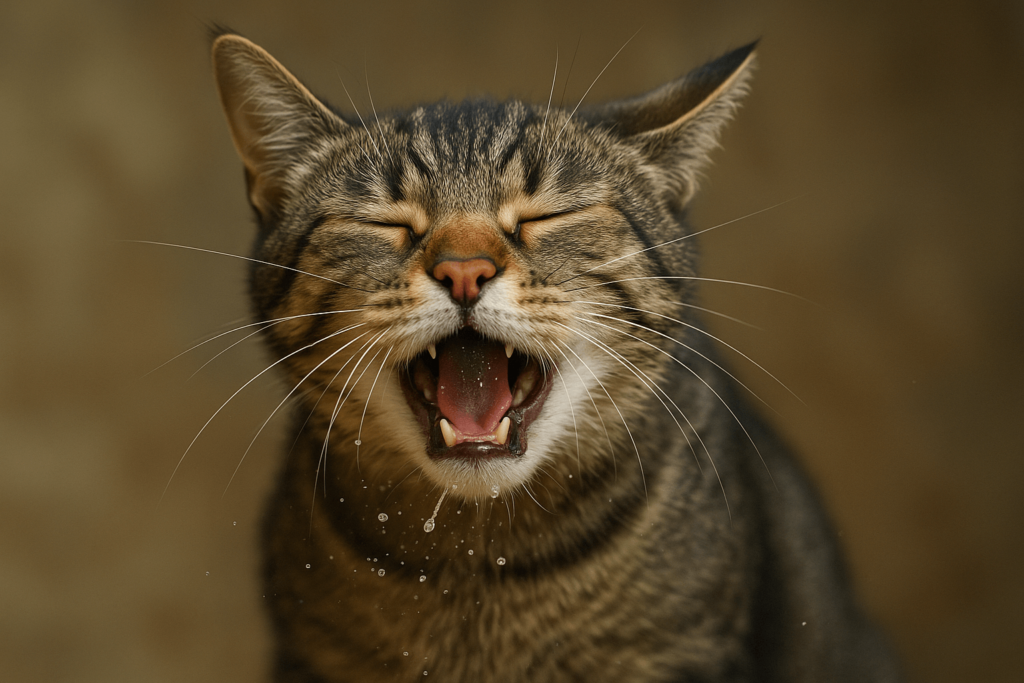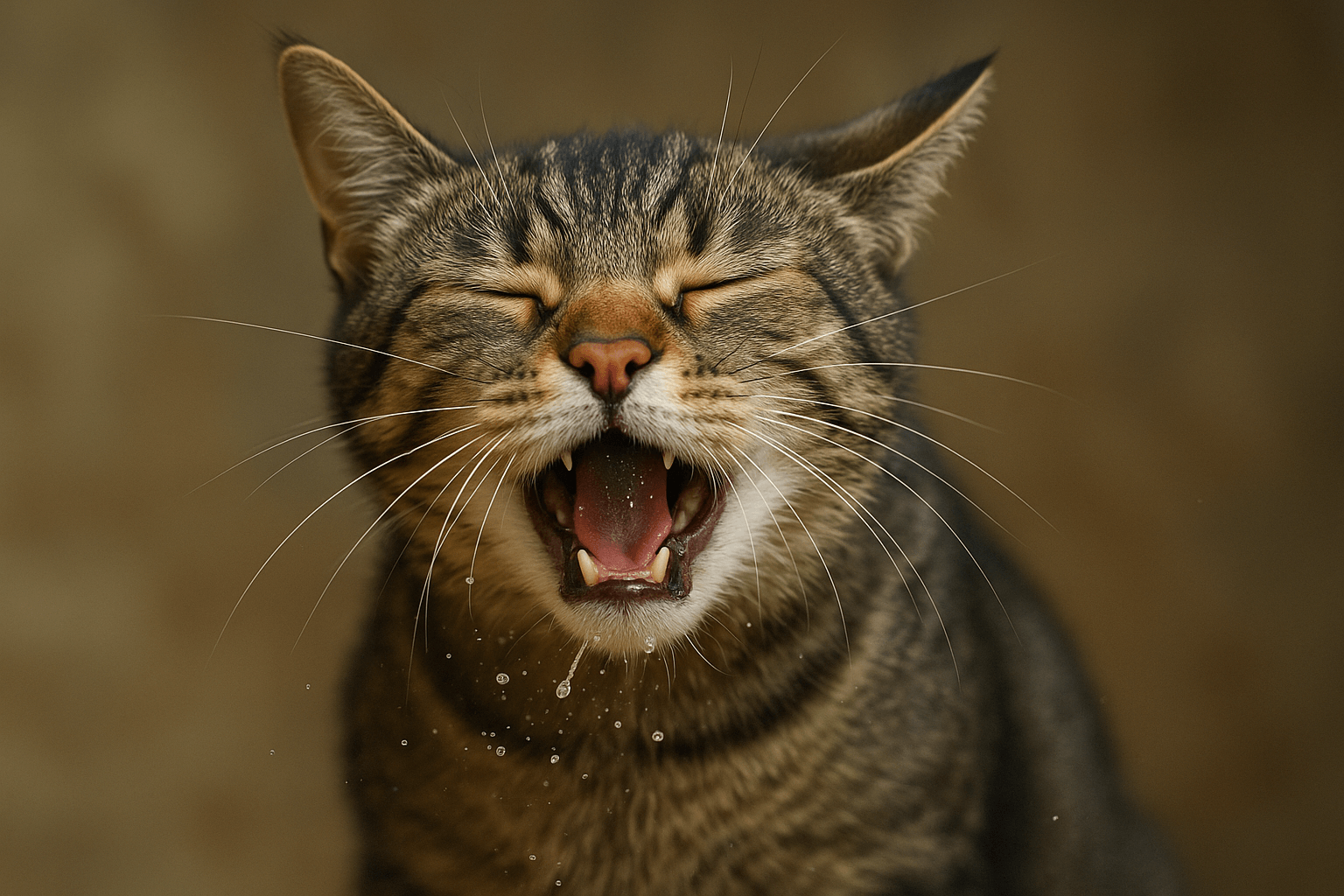Why Is My Cat Sniffling and Sneezing?
Cats are known for their independent and resilient nature, but even the hardiest felines can experience health issues. If your cat is sniffling and sneezing, it’s natural to feel concerned. These symptoms can range from mild and temporary to signs of an underlying condition that requires veterinary attention. Understanding the potential causes, recognizing warning signs, and knowing how to provide care are essential steps in ensuring your cat’s well-being. In this blog post, we’ll explore everything you need to know about cat sniffling and sneezing, helping you address these symptoms with confidence and compassion.
Common Causes of Cat Sniffling and Sneezing
Sniffling and sneezing in cats can stem from a variety of causes, ranging from minor irritations to more serious health concerns. Identifying the root cause is key to determining the appropriate course of action.
Upper Respiratory Infections (URIs):
Viral or bacterial infections, such as feline herpesvirus or calicivirus, are common culprits behind sneezing and nasal discharge in cats.Allergies:
Cats can develop allergies to dust, pollen, mold, or household chemicals, leading to sneezing and nasal irritation.Foreign Objects:
Small particles like grass seeds, dirt, or hair can become lodged in a cat’s nasal passages, causing persistent sneezing.Dental Issues:
Dental abscesses or infections can sometimes affect the sinuses, resulting in sniffling and sneezing.Environmental Irritants:
Strong odors from cleaning products, perfumes, or smoke may irritate a cat’s sensitive respiratory system.
Understanding these potential causes allows you to assess your cat’s condition and seek help if needed.

Signs That Your Cat Needs Veterinary Attention
While occasional sneezing may not be a cause for alarm, certain symptoms indicate that your cat requires professional care. Recognizing these red flags ensures timely intervention.
Persistent Sneezing:
If your cat sneezes frequently over several days, it could signal an infection or chronic condition requiring treatment.Nasal Discharge:
Thick, yellow, green, or bloody nasal discharge often points to a more serious issue than clear, watery discharge.Lethargy or Loss of Appetite:
A lack of energy or refusal to eat may accompany respiratory infections, indicating your cat feels unwell.Eye Discharge or Squinting:
Watery eyes, crusty discharge, or squinting can suggest a respiratory infection affecting the eyes as well.Difficulty Breathing:
Labored breathing, wheezing, or open-mouth breathing is a medical emergency that requires immediate attention.
By staying vigilant for these signs, you can ensure your cat receives the care they need to recover quickly and comfortably.
Check this guide 👉Why Is My Cat Sneezing Mucus? Best 7 Expert Tips!
Check this guide 👉Cat Sneezing No Other Symptoms: Best 7 Expert Tips!
Check this guide 👉Why Does My Cat Sneeze So Much? Best 7 Expert Tips!
Symptoms to Monitor | Possible Underlying Causes |
|---|---|
Frequent sneezing | Upper respiratory infections |
Nasal congestion | Allergies or foreign objects |
Watery or crusty eyes | Feline herpesvirus or conjunctivitis |
Loss of appetite | Dental issues or systemic illness |
Blood in nasal discharge | Trauma, tumors, or severe infections |
How to Comfort a Sniffling and Sneezing Cat at Home
While some cases of sniffling and sneezing require veterinary care, there are steps you can take to comfort your cat and ease their symptoms at home.
Provide a Warm, Humid Environment:
Use a humidifier or bring your cat into a steamy bathroom to help loosen nasal congestion and soothe irritated airways.Keep Them Hydrated:
Encourage your cat to drink water by offering fresh, clean water or slightly warming their food to increase moisture content.Clean Their Nose Gently:
Use a soft, damp cloth to wipe away any nasal discharge, preventing buildup and irritation.Offer Nutritious Food:
Serve highly palatable, nutrient-rich meals to entice your cat to eat, supporting their immune system during recovery.Minimize Stress:
Create a calm environment by reducing noise and disturbances, allowing your cat to rest and heal peacefully.
These simple measures can make a big difference in keeping your cat comfortable while they recover.
Preventing Future Episodes of Sniffling and Sneezing
Prevention is always better than cure when it comes to your cat’s health. Taking proactive steps can reduce the likelihood of future sneezing episodes.
Vaccinate Regularly:
Keep your cat up-to-date on vaccinations to protect against common respiratory viruses like feline herpesvirus and calicivirus.Maintain a Clean Environment:
Regularly clean your home to reduce allergens, dust, and irritants that could trigger sneezing.Avoid Strong Odors:
Limit exposure to cigarette smoke, scented candles, or harsh cleaning products that can irritate your cat’s respiratory system.Monitor for Early Signs of Illness:
Pay attention to subtle changes in behavior or health, addressing potential issues before they worsen.Schedule Routine Vet Check-Ups:
Annual wellness exams help detect underlying conditions early, ensuring your cat stays healthy year-round.
By prioritizing prevention, you can minimize the chances of your cat experiencing sniffling and sneezing episodes.
When to Use Natural Remedies
If you’re considering natural remedies for your cat’s sniffling and sneezing, it’s important to proceed with caution and consult your vet first. Here are some safe options to explore under professional guidance.
Steam Therapy:
Bring your cat into a steam-filled bathroom for 10-15 minutes to help clear nasal passages naturally.Saline Drops:
Use veterinarian-approved saline drops to gently flush out your cat’s nose, relieving mild congestion.Herbal Teas (for Scent Only):
The aroma of chamomile or peppermint tea (not ingested) can soothe irritated airways when diffused safely in the room.Probiotics:
Adding probiotics to your cat’s diet supports gut health, which can boost their immune system.Coconut Oil:
A small amount of coconut oil mixed into food may help reduce inflammation and support overall health.
Natural remedies can complement veterinary care but should never replace professional treatment.
How to Manage Multi-Cat Households
In homes with multiple cats, managing sniffling and sneezing requires extra care to prevent the spread of infections. These tips help safeguard all your feline family members.
Separate Sick Cats Temporarily:
Isolate the affected cat in a quiet room to minimize contact with healthy cats until they recover.Disinfect Shared Spaces:
Clean litter boxes, food bowls, toys, and bedding regularly to eliminate germs and reduce transmission risks.Boost Immunity Through Nutrition:
Feed a balanced diet rich in vitamins and antioxidants to strengthen the immune systems of all your cats.Monitor Closely for Symptoms:
Watch for signs of illness in other cats, intervening early if any show symptoms of sniffling or sneezing.Vaccinate All Cats Equally:
Ensure every cat in the household receives the same level of protection through vaccinations.
Taking these precautions helps maintain harmony and health in multi-cat environments.
Addressing Chronic Sneezing
If your cat experiences chronic sneezing despite treatment, it may indicate an ongoing issue that requires further investigation. Here are potential causes and solutions to consider.
Chronic Rhinitis:
Persistent inflammation of the nasal passages may require long-term management with medication or supplements.Polyps or Growths:
Nasal polyps or tumors can obstruct airways, necessitating surgical removal or specialized treatment.Underlying Allergies:
Chronic sneezing may result from undiagnosed allergies; allergy testing can identify triggers and guide treatment.Immune System Disorders:
Conditions like feline immunodeficiency virus (FIV) can compromise immunity, leading to recurring infections.Environmental Adjustments:
Reducing exposure to irritants, improving ventilation, and maintaining cleanliness can alleviate chronic symptoms.
Addressing chronic sneezing involves patience and collaboration with your vet to find the best solution for your cat’s unique needs.
Frequently Asked Questions About Cat Sniffling and Sneezing
Can cats catch colds like humans?
Yes, cats can develop upper respiratory infections similar to human colds, but they are caused by different pathogens.
How long does a cat cold last?
Mild cases typically resolve within 7-10 days, but more severe infections may require veterinary treatment.
Is sneezing contagious between cats?
Some respiratory infections, like feline herpesvirus, are highly contagious among cats, especially in multi-cat households.
Should I give my cat over-the-counter medications?
No, never give your cat human medications without consulting a vet, as they can be toxic.
Can stress cause sneezing in cats?
While stress itself doesn’t directly cause sneezing, it can weaken the immune system, making cats more susceptible to infections.
Supporting Your Cat Through Sniffling and Sneezing
Sniffling and sneezing in cats can be distressing, but understanding the causes and knowing how to respond empowers you to act swiftly and effectively. Whether it’s providing comfort at home, seeking veterinary care, or taking preventive measures, your attentiveness plays a crucial role in your cat’s recovery and overall health. By staying informed and proactive, you can ensure your feline companion remains happy, healthy, and free from discomfort. Remember, your love and care are the best remedies of all.
Canned Pumpkin for Cat Diarrhea: Best 7 Expert Tips! Natural remedy to firm stools, soothe upset bellies, and support gut health safely.
Can a Cat Give You Scabies? Best 7 Expert Tips! Discover the truth about feline mites, human skin risks, and how to protect yourself—without panic.
Cat Flea vs Human Flea: Best 7 Expert Tips! Discover the truth about bites, species, and how to eliminate infestations for good.
Weird Cat Behaviors: Best 7 Expert Tips! Discover why cats do strange things—and how to understand, not punish, their instincts for a happier home.





